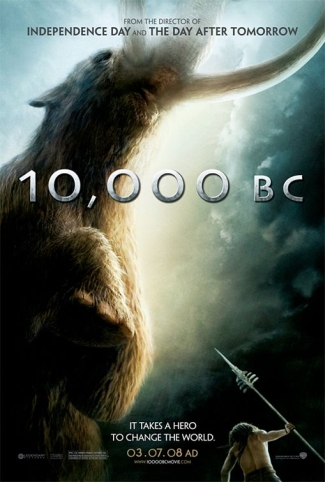
10,000 BC
US, 2008, 109 minutes, Colour.
Steven Strait, Camilla Belle, Cliff Curtis, Joel Virgil, Nathanial Baring, Mona Hammond.
Directed by Roland Emmerich.
The trouble with prehistoric stories is that we know they have to be made up since there are no records. All during the 20th century there were all kinds of films from ‘lands that time forgot’ about ‘people that time forgot’, locations in ‘the valley of Gwangi’ and even Raquel Welch in One Million Years BC. Which means that the present contender for prehistoric film champion comes 990,000 years later!
This is the kind of film that ‘sophisticated’ types look down their noses at. And they will do so with this one. Risking lack of sophistication, I found myself enjoying 10.000 BC much more than expected – although distractions like thinking that the first part was like John Ford’s The Searchers or that the latter part was like a less blood and gory Apocalypto compensated with cinema buffery.
Omar Sharif, with his characteristic accent and tone, is the narrator. He takes us back into unsophisticated times of hunters who relied on the mammoths for food and hides. (One German journalist, perhaps making this up before he saw the film, called it a mammoth failure! – which, of course, it isn’t.) They also believe in rituals and mystical identification with leaders and spiritual myths.
Reality intrudes after a rousing computergraphics mammoth hunt and stampede (well worth seeing) and a group of slavers capture the hunters. The hero, not always heroic but learning to mature (Steven Strait), pursues the captives, especially the special woman (Camilla Belle) who is a focus of prophecy. Cliff Curtis is the wise mentor and Nat Baring the adolescent runaway.
All this happens in the snow clad mountains of New Zealand’s south island which looks quite majestic. The transition is to the jungle (filmed in South Africa) where computergraphics produce monstrous ravenous birds and a giant sabre-toothed tiger. Later (in the dunes of Namibia), they encounter a tribe of hunter-gatherers and together they find the captives working as slaves (along with the mammoths again) on early days elaborate palaces and pyramids.
Battle ensues with a cast of computer thousands, all spectacular (along with the mammoths which are a real attraction) and, finally, the hunters return home with seeds for crops and the next era is under way.
It was directed by Roland Emmerich who has been into spectacles in all eras with Stargate, Independence Day, Godzilla and The Day After Tomorrow as well as having Mel Gibson beat the British as The Patriot in the War of Independence.
1.The popular story, epic, pre-history, the writer's imagination, human history, the history of the Earth, creatures? Evolution? The
2.The quality of the photography, the locations and the impact?
3.Action and effects, the mammoths, the birds, the tiger, the fights? The atmospheric and heightened score?
4.The humans, basic, hunters, crops, surviving? Religion and superstition? Mystical union? Rituals and legends? Africa, the cradle of civilisation, hunters, raiders and slavers, tribes, crop gatherers, the overtones of ancient Egypt? Civilisation? The battle sequences?
5.The mammoths and their impact, the visuals, the sounds, the fights, running, trapping the mammoths, killing? The mammoths on the pyramids and their trampling people? The tiger and the pit, later, the teeth, the confrontation with D' Leh? The tribesmen believing that he was the one who was sent because of the tiger? The birds and their prehistoric look, flight, large, the attacks, killing?
6.Omar Sharif and his narrative?
7.The legend, the old mother, destiny, the hunters, having to change, the orphan girl and her place in their midst? The raiders, their horses, killers? Rituals? Children, their father going from the tribe to find new land, keeping it secret?
8.The passing of time, the children growing up, the boys' rivalry, D' Leh named as a coward because of his father's behaviour, Evolet and her love for D' Leh? Tic Tic and his care of D' Leh? The mammoth hunt, the boys being dragged, D' Leh and his being caught, his lance, the death of the mammoth, his taking the white spear, the fact that he had lied, his surrendering it?
9.The raiders, the pillage, killing? Taking Evolet and the warriors? The leader, his wanting to possess Evolet? His henchmen, cruelty? The trek, the rescue, their being recaptured, in the boats, the slaves of the pyramid builders?
10.D 'Leh and his decision to go, Tic Tic going with him, Ka 'Ren, Baku following behind? The mother identifying with them in her mystic experiences? Food, climbing the mountains, the snow and the blizzards, getting to the jungle, the monstrous birds and the fights, hiding in the trees, D' Leh and his falling into the pit, freeing the tiger, its not attacking him? The failure to recapture Evolet? In the desert, Tic Tic and his being wounded, going on?
11.Meeting the tribe, their leader, his knowledge of the language because of D' Leh's father, the truth and the legend? The tribe and their support of D' Leh? Joining him?
12.The other tribes joining, the massive force, the trek through the dunes, their being lost, the story of the fixed star, D 'Leh's explanation to Evolet? Their following the star and finding the pyramids and the slaves?
13.The evocation of ancient Egypt, the boats on the river, the massive buildings, the workers, slavery, the priests, the veiled leader? Demanding the sacrifice and Ka'Ren being thrown over the building?
14.D' Leh and the chief infiltrating the slaves, freeing them, the attack, the mammoths and their charge? The lances? Evolet and her being taken by the slave raider, the confrontation with D' Leh? Her death?
15.The victory of D' Leh and the slaves? Evolet and her death - the experience of Mother? Her identifying with Evolet, her dying and Evolet coming to life?
16.The return, a new era, the crops and a new way of life?